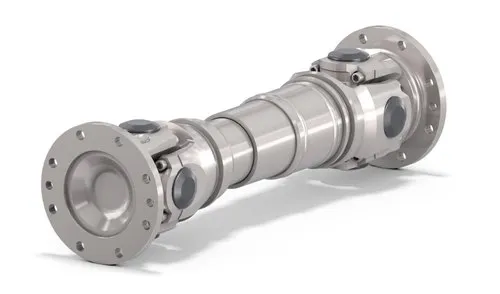Cardan Shaft helps to transmit more power and torque when the machine is running, as well as cushioning, damping, and improving the dynamic performance of the shaft system.
Rolling mill cardan shafts, also known as universal joints, are a crucial component in rolling mill machinery. They are responsible for transmitting power and torque between two shafts that are not in a straight line or are at an angle to each other. Rolling mill cardan shafts are designed to compensate for misalignments and provide smooth, efficient power transmission between the motor and the rolling mill.
The rolling mill cardan shaft is typically made up of a series of components, including a yoke, a cross or spider, and two bearing caps. The yoke connects the cardan shaft to the motor or gearbox, while the cross or spider connects the two shafts that need to transmit power. The bearing caps hold the cross or spider in place and allow for smooth rotation and movement.
Some of the applications and benefits of rolling mill cardan shafts include:
- Efficient Power Transmission: Rolling mill cardan shafts provide smooth and efficient power transmission between the motor and the rolling mill, allowing for consistent operation and output.
- Compensation for Misalignments: Rolling mill cardan shafts are designed to compensate for misalignments between two shafts, which can occur due to changes in temperature or other factors.
- Improved Safety: Rolling mill cardan shafts can improve safety in rolling mill operations by reducing the risk of equipment failure or damage due to misalignment or other issues.
- Reduced Downtime: By providing smooth and efficient power transmission and compensating for misalignments, rolling mill cardan shafts can help to reduce downtime and maintenance costs.
- Durability: Rolling mill cardan shafts are designed to withstand significant stress and torque during operation, making them a durable and long-lasting component of rolling mill machinery.
Rolling mill cardan shafts are a critical component of rolling mill machinery, providing efficient power transmission and compensating for misalignments between two shafts. Regular maintenance and inspection of rolling mill cardan shafts is important to ensure that they are in good working condition and to prevent any potential failures or breakdowns during use.


